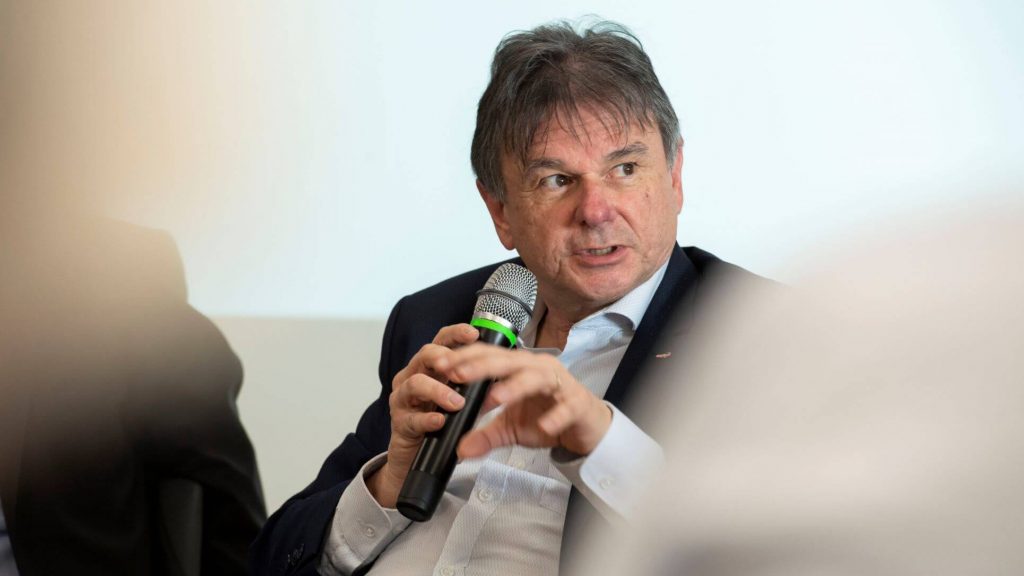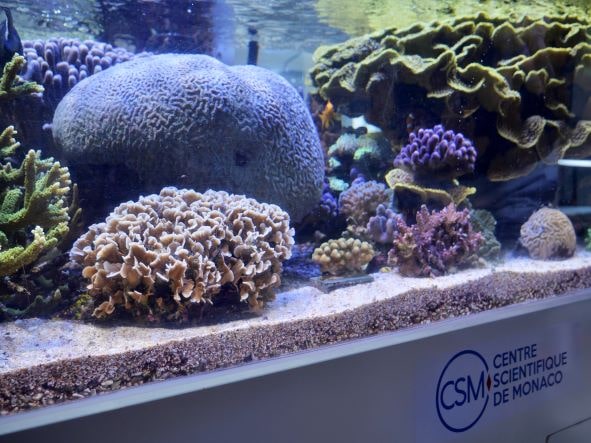PORTRAIT. Denis Allemand, 20 years at the helm of the Monaco Scientific Centre

In October, Denis Allemand will be celebrating an anniversary unlike any other: 20 years at the helm of the Monaco Scientific Centre. A look back at a career driven by passion and curiosity.
We meet him in his office at the Monaco Scientific Centre. Rolled-up sleeves, hair greying, he is impressively easy to talk to – calm, thoughtful and humble. His colleague at the Centre Scientifique de Monaco (CSM) describes him as “a pilgrim, he goes out to preach knowledge,” referring to forgotten places where Denis has gone to give lectures, to only a handful of people. A true enthusiast, defined by that bottomless pit of thirst for knowledge. And, naturally, by the transmission of this knowledge.
The Monaco Scientific Centre has become what it is thanks to Denis Allemand. A physiologist by training, “not marine, but human” he says, nothing destined the Monegasque to find himself at the head of the CSM for twenty years.
Here everything needed to be done, it was starting from scratch, it was magnificent
Coral, penguins and DNA
He came to the CSM as a researcher 30 years ago and took over as director 20 years ago to rebuild it from scratch. To do this, Denis and a former colleague launched the first research programme on Mediterranean red coral. For this is indeed the spearhead of the laboratory: coral. Red coral first, for which the CSM is renowned, and then tropical coral.
“Here everything needed to be done, it was starting from scratch, it was magnificent,” reminisces Denis. The first objective was to expand the staff. Teams arrived, then students… The project grew day by day, reaching today more than 70 people and becoming the laboratory with the oldest coral culture in controlled conditions in the world.
This was followed by the creation of the marine biology department, which stemmed from the coral project, then a polar biology department focusing on the study of penguins and a medical biology department (the three pillars of the CSM: coral, penguins and DNA). A source of pride, since “the Centre was one of the first to be able to carry out PCR tests thanks to an analysis platform here.”

© CSM 
© CSM / A. Dias Mota
The knowledge that is found there is knowledge that is going to last for two hundred years; the website will be gone
Scientific legacy
The CSM is not the only success of Denis Allemand, as he is also a professor at the University of Nice. “I’ll probably be retiring soon,” Denis confides, and it is one of his former students who is taking over his position in the laboratory at the University of Nice. My scientific legacy is well assured,” he says with a smile. “I’m very happy about that, it’s great to see students who finally surpass you.”
“You know, to be a researcher is to be curious. And I’ve always liked that. Both curiosity and the transmission of knowledge.” Curiosity, knowledge and education. Three major aspects of the professor’s personality. And where does knowledge come from? In books, which Denis has been piling up in his office and home for years. “I love to read and it’s a tragedy because I don’t know where to put them anymore…”
“I am from an older generation that thinks that books are very important, not everything can be found on the Internet. The knowledge that is found there is knowledge that will last for two hundred years; the website will be gone.” As proof of this, Denis regularly uses “a book on red coral dating back to 1859” at conferences.
A passion for words that he also uses to transmit his own knowledge. Denis Allemand takes very much to heart the role of mediation that a researcher must exercise, through the regular practice of scientific popularisation. His most recent article for the magazine Espèces: “Des bras, des pattes et des tentacules”, on biodiversity.
Brimming with passion
Motivated by “the desire to do things, the desire to create and to know”, Denis applies the same pedagogy in everyday life. Apart from the sciences, he reads about ancient zoology, about tourism in the previous century… However, his favourite field is vernacular and rock-cut architecture. A passion that comes from, as you may have guessed, his curiosity.
“When I was young, I wanted to visit a site that was inaccessible but I never managed to, and one day a friend took me there. A medieval construction on a 20-centimetre narrow ledge with 200 metres of void below, absolutely fantastic stuff. It fascinated me so much that I continued.” Denis then joined forces with an archaeologist friend to develop the study of this type of architecture and has already published on the subject.
And when we ask him what he does outside of work… “I work at home,” he replies with a laugh. “What is important is to leave a path for the future, not just to do research for the sake of knowledge. This knowledge must be passed on.” Passion, that blurs the line between work and leisure, even twenty years later.
>> READ ALSO: Climate report: what consequences for life in the Principality?









